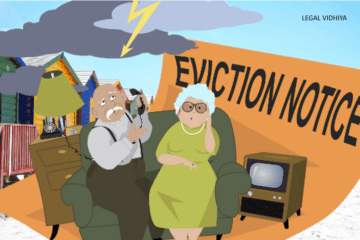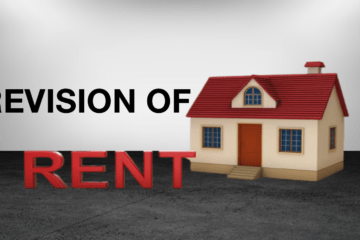
This article is written by Poornima of University of Allahabad,1st Semester, an intern under Legal Vidhiya
Abstract
Rent tribunal is a tribunal that hear appeals against the decision of both the rent court and the rent authority.
The Indian Constitution has made provisions for establishing up State-level Rent Tribunals, which will provide relief to rent litigants. These tribunals will be able to solve or decide disputes on rent and will be independent of all courts, except the Supreme Court.
The Constitution (Seventy-Fifth Amendment) Act, 1993 is the official or formal name of the 75th Amendment of the Indian Constitution. This contains provisions for the establishment of rent control tribunals.
The Seventy-fifth Amendment came into effect on 15 May 1994. PV Narasimha Rao was the Prime Minister when this amendment was passed in the forty-fourth year of the Republic of India.
This constitutional amendment amends article 323B. It highlights the establishment of State-level Rent Tribunals. According to Article 136 of the Constitution, this was done to limit the jurisdiction of all courts, excluding the Supreme Court and for establishment of tribunals only for specific purpose of rent problems.
Keywords: rent tribunal, seventy fifth amendment, appeal, appellate tribunal, state rent laws, article 323B
Introduction
There are many flaws in the rent control laws operating in a number of States and it resulted in a number of unforeseen consequences.
Negative legal repercussions include mounting and unending litigation, the court’s failure to deliver timely justice, the evolution of practices and procedures to get around the operations of rent legislation, and the steady shrinkage of the rental housing market.
In the case of Prabhakaran Nair and others v. Status of Tamil Nadu (Civil Writ Petition 506 of 1986 and other writs), the Supreme Court noted the fragile state of rent litigation in the country. Further stated that the Supreme Court and the High Courts should be divested of the heavy burden of rent litigation.
Tiers of appeals should be reduced. Laws supposed to be logical, rational, and unambiguous. Litigations need to be resolved as soon as possible. It would be wise to investigate the possibility of an all-India National Rent Tribunal with a quicker procedure.
The Constitution’s Part XIVA, Article 323B, is up for revision. This was done in order to eliminate the Supreme Court’s jurisdiction under Article 136 of the Constitution, establish State-level Rent Tribunals, and decrease the number of appeals stages. As a result, rent litigants will be able to receivetimely justice and relief.
Article 323B: Tribunals for other matters.
This article talks about the establishment of tribunals for other matters and these other matters are briefly explained in further clauses
(1) The appropriate Legislature may, by law, provide for the adjudication or trial by tribunals of any disputes, complaints, or offences with respect to all or any of the matters specified in clause (2) with respect to which such Legislature has power to make laws.
(2) The matters referred to in clause (1) are the following, namely: –
(a) levy, assessment, collection and enforcement of any tax;
(b) foreign exchange, import and export across customs frontiers;
(c) industrial and labour disputes;
(d) land reforms by way of acquisition by the State of any estate as defined in article 31A or of any rights therein or the extinguishment or modification of any such rights or by way of ceiling on agricultural land or in any other way;
(e) ceiling on urban property;
(f) elections to either House of Parliament or the House or either House of the Legislature of a State, but excluding the matters referred to in article 329 and article 329A;
(g) production, procurement, supply and distribution of food-stuffs (including edible oilseeds and oils) and such other goods as the President may, by public notification, declare to be essential goods for the purpose of this article and control of prices of such goods;
(h) rent, its regulation and control and tenancy issues including the right, title and interest of landlords and tenants;
(i) offences against laws with respect to any of the matters specified in sub-clauses (a) to (h) and fees in respect of any of those matters;
(j) any matter incidental to any of the matters specified in sub-clauses (a) to (i).
(3) A law made under clause (1) may-
(a) provide for the establishment of a hierarchy of tribunals;
(b) specify the jurisdiction, powers (including the power to punish for contempt) and authority which may be exercised by each of the said tribunals;
(c) provide for the procedure (including provisions as to limitation and rules of evidence) to be followed by the said tribunals;
(d) exclude the jurisdiction of all courts, except the jurisdiction of the Supreme Court under article 136, with respect to all or any of the matters falling within the jurisdiction of the said tribunals;
(e) provide for the transfer to each such tribunal of any cases pending before any court or any other authority immediately before the establishment of such tribunal as would have been within the jurisdiction of such tribunal if the causes of action on which such suits or proceedings are based had arisen after such establishment;
(f) contain such supplemental, incidental and consequential provisions (including provisions as to fees) as the appropriate Legislature may deem necessary for the effective functioning of, and for the speedy disposal of cases by, and the enforcement of the orders of, such tribunals.
(4) The provisions of this article shall have effect notwithstanding anything in any other provision of this Constitution or in any other law for the time being in force.
The Model Rent Act, 2021
The Model Rent Act has the power to effect a big and major change in the residential and rental markets in the whole country, once state governments enact them as laws in their own states and UTs. One of the most important parts of this act is that it takes rental property out of the jurisdiction of civil courts and has created its own judicial powers with the enabling provision of being able to enforce the orders similar to that of civil courts. It also has a specified timeline for providing justice and is expected to bring efficiency in the rental property space.
The Rent Authority and Rent Court or Tribunal are the two main features of this Act.
Rent Authority
The Rent Authority has the powers of the Rent Court as documented in Sections 4, 9, 10, 14, 15, 19 or 20 and the procedures laid down in Sections 35 & 36 of the latest Model Rent Act.
The Rent Authority will be controlled by an officer not below the rank of deputy collector and should be appointed by the District Magistrate or District Collector with prior approval of the State Government or Union Territory Administration.
A person can appeal against an order of a Rent Authority to a Rent Court within 30 days of passing the order.
Register Rent Agreements
The most significant role of the Rent Authority is to register the rent agreement and provide a unique identification number. This is an important step in structuring the rental market. By making it mandatory to register rent agreements, there is now a system within which the rental markets have to function. The tenancy agreement will be uploaded on the website in the vernacular language of the state, along with the decided documents. Details of this process have not yet been disclosed in the Model Act.
Settle Rent Amounts
If a landlord upgrades a rented property, he can demand an enhanced rent one month after the completion of the renovation. In case there is any dispute about the enhanced rent, the Rent Authority can not only help determine the enhanced charges but also from when these charges become applicable.
In case the landlord does not accept rent and other charges, the amount can be sent by postal orders for two months. If the issue is not resolved even after this period, the tenant can deposit the rent and charges with the Rent Authority. Even when the tenant cannot determine whom to pay the rent to, he may pay it to the Rent Authority, which will inquire about the case and decide whom the rent has to be paid to. There is no issue held against a landlord who withdraws these amounts from the rent authority, provided it is the amount agreed upon in the Rent Agreement. All maintenance disputes and their resolution are in the purview of the Rent Authority.
Role of Property Manager
The Model Rent Act has defined the role of the property manager. If he works in contravention of the rules defined or against the instructions of the landlord, the Rent Authority can be approached. The Act says, “The Rent Authority may, on an application made to it by the landlord or tenant in that behalf, remove the property manager or impose such costs on the property manager so as to compensate any loss incurred by the landlord or tenant due to such contravention.”
Thus, the Rent Authority manages all operational issues of the Rent Act and also has basic powers of addressing disputes between the landlord and tenant in select cases and between the landlord or tenant and the property manager. All judicial functions are under the purview of the Rent Court or Rent Magistrate.
Rent Court
The Rent Tribunal would be a District Judge or Additional District Judge, appointed by the State or Union Territory administration in consultation with the jurisdictional High Court.
The Rent Court will be headed by an Additional Collector or Additional District Magistrate or officer of similar rank. He is to be appointed by the District Magistrate or District Collector with the approval of the State government or the Union Territory administration.
These courts will not be guided by the Code of Civil Procedure. This is an important statement in the law as this establishes the complete authority of these courts on rent issues.
The Rent Court or Rent Tribunal has to dispose of the case within 60 days. One significant issue that has been addressed is the time taken to pass orders. This is a significant improvement on the current scenario where the cases in civil courts drag on for decades.
There can be no more than three adjournments and each adjournment has to have a valid reason and a fee has to be paid for each.
Procedure in Rent Court
The entire process of functioning in the Rent Court or Tribunal has been spelt out in the Act.
- Landlord or tenant to file the application or appeal in the Rent Court or Rent Tribunal, along with an affidavit and a copy of documents, if any
- The Rent Court or Tribunal will then issue a “notice to the opposite party, accompanied by copies of application or appeal, affidavit and documents”
- The opposite party has to send a copy of the reply to the applicant and then file a reply to the court
- The applicant can file a reply to the opposite party and then file a rejoinder to the Court
- The Rent Court or Tribunal will fix a date of hearing and hold a “summary inquiry as it deems necessary”
- The Rent Court or Tribunal has a maximum of 60 days to dispose of the application or appeal
- The evidence of the witness in Rent Courts or Tribunals are filed as an affidavit. Only where it deems necessary, the witness can be called in for cross examination
- Summons are issued as per civil courts protocol
- Applications and appeals should be in the prescribed form
- The Rent Authority or Court or Tribunal will allow not more than three adjournments and the reasons will be recorded for each. The party requesting the adjournment is also required to pay a fee for each
- There is a 90-day period from the date of filing to close every application
- The only exception to this is where there is reply and/or a rejoinder as in
Section 21 Clauses c and d, which has to be cleared within 30 days Powers of the Rent Court/Tribunal.
These are the same as a civil court under the Code of Civil Procedure, 1908 for:
(a) summoning and enforcing the attendance of any person and examining him on oath;
(b) requiring the discovery and production of documents;
(c) issuing commissions for examination of the witnesses or documents;
(d) issuing commission for local investigation;
(e) receiving evidence on affidavits;
(f) dismissing an application or appeal for default or deciding it ex-parte;
(g) setting aside any order of dismissal of any application or appeal for default or any other order passed by it ex-parte;
(h) execution of its orders and decisions under this Act without reference to any civil court;
(i) reviewing its orders and decisions;
(j) revision of orders and decisions of Rent Authority and Rent Court and;
(k) any other matter, which may be prescribed.
Timelines
The Rent Court has been deemed a civil court with powers of execution of its orders. These can only be challenged within 30 days of passing an order, in a Rent Tribunal in the same geography. The Tribunal has 30 days to serve notice, along with the copy of the order and has to dispose of the case within 60 days of serving the notice. It may allow documents during the hearings but one document can be presented only once during the hearing. Interlocutory orders are allowed and after the hearing the Tribunal can confirm, set aside or modify the orders of the Rent Court.
Execution of the Order
The Rent Court, on the basis of application filed by any party, can perform the following execution functions:
The party in whose favour the order was passed get the delivery of premises.
Freeze bank accounts of the opposite party to recover the dues specified in the order.
Appoint the right officials from the Rent Court or the local administration to execute the order.
The execution has to happen within 30 days of passing the order. Help from the local police can be provided to the applicant, only for a fee.
A law that spells out the functions to this level of detail, has a greater chance of success. Very little is left to interpretation and therefore the process can be speedily executed. The only delay is for the governments of State and Union Territories to set up the Rent Authorities, Rent Courts and Tribunals at the earliest. While the law has suggested that this should be a prospective law, some states like Uttar Pradesh have executed this as a retrospective law. It remains to be seen whether there would be operational hiccups. Maharashtra has announced that it is studying the law prior to a decision to implement.
References
- https://blog.ipleaders.in/analysis-uttar-pradesh-regulation-urban-premises-tenancy-ordinance-2021/
- https://prsindia.org/billtrack/the-model-tenancy-act-2021
- https://www.indiacode.nic.in/show-data?actid=AC_JK_69_607_00012_00012_1613975448991&orderno=32
- https://timesofindia.indiatimes.com/blogs/A-brick-on-the-wall/model-tenancy-act-spells-out-roles-of-rent-authority-rent-courts/




0 Comments